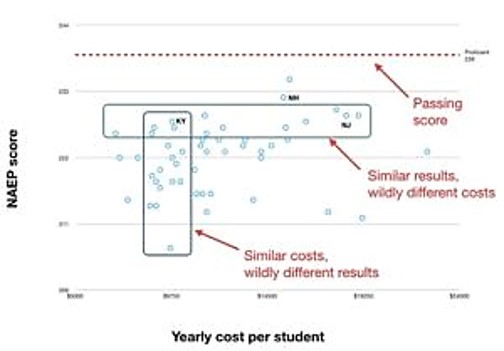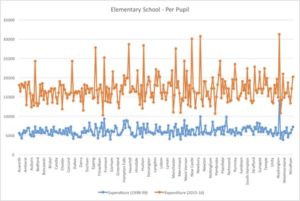Our representatives in Concord are currently discussing how much money school districts require, where that money should come from, and how it should be collected.
But three simple graphs are sufficient to demonstrate decisively that money is not the issue.
The first graph shows that since 1970, tripling school spending (in inflation-adjusted dollars) has had no effect on student achievement:

So the answer to the question Shouldn’t we be spending more money on schools? is No.
The second graph shows that there is no correlation at all between what a state spends on a student, and how well the students in that state perform:

So the answer to the question How much money should we be spending on schools? is That’s the wrong question.
The third graph shows that every district is now spending more, adjusted for inflation, than even the richest districts were spending before Claremont. Every district is now a ‘rich district’:
So the answer to the question How can our community lower our property tax rates? is Go back to doing whatever you were doing in 1998 — saving, on average, about $10,000 per student per year, without any decrease in student achievement.
Once you’ve seen these graphs, to continue to argue that money is the issue is disingenuous if you’ve understood them, and fatuous if you haven’t.
And in either case, continuing to focus the discussion on money, instead of on student achievement, is preventing us from having the discussion that we need to have, which centers around two questions that no one ever seems to want to consider:
- If a student wants to learn something, who can stop him?
- If a student doesn’t want to learn something, who can make him?
The Coalition for Fairness in Education (CFE) has a longer presentation on this, which is a comprehensive response to Andru Volinsky’s Traveling School Funding Show.
Since Volinsky wants to give schools more money, school administrators have been eager to provide him with a forum for promoting that view. Since CFE is suggesting that they would actually be able to accomplish more by spending less, it’s hard for us to get the same kind of welcome.
Fortunately, there’s the Internet. So you can watch the presentation online at the link above. But if you’d like to see the live version in your area, please contact me about setting that up.

